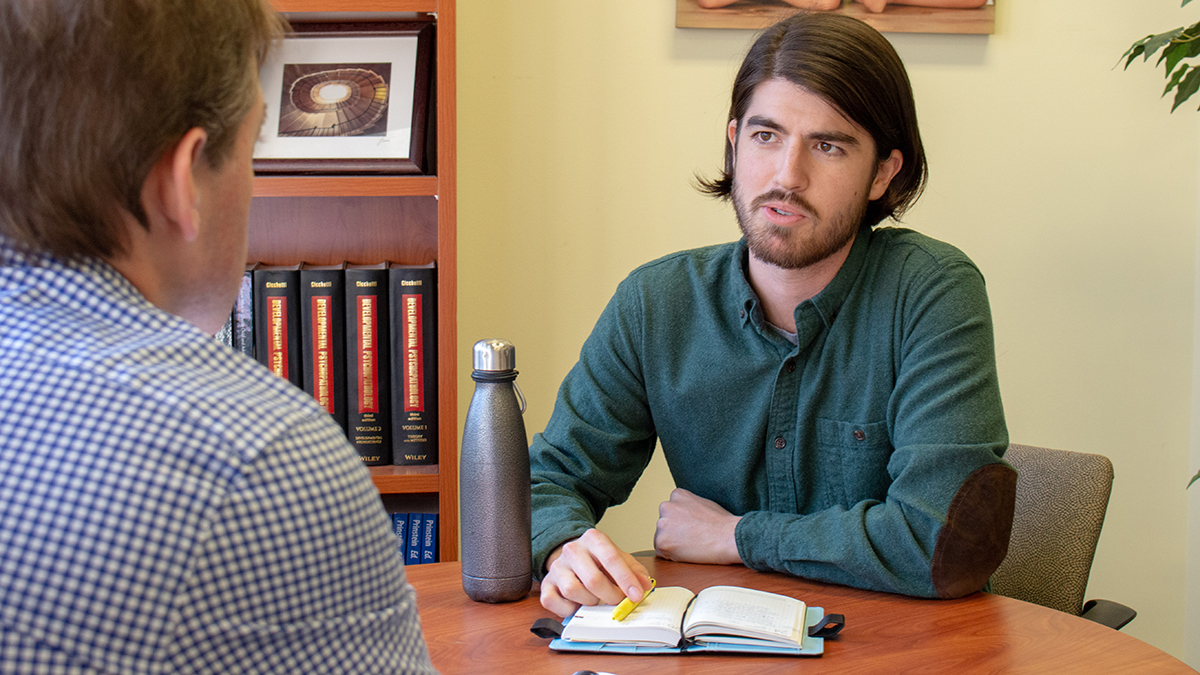From math to mental health
Graduate student Matthew Clayton works with College of Arts & Sciences professor Mitch Prinstein to uncover the factors that influence adolescent mental health.

Matthew Clayton changed his career track to psychology after observing unmet mental health needs among high school teens during his Teach for America stint.
A year after he graduated from Duke University as a Robertson Scholar, Clayton headed to southeastern Arkansas in 2013 to teach high school math. He quickly realized his limitations in dealing with students’ emotional health needs and was frustrated with the lack of resources available in the small community.
“Teaching exposed me to the experiences and struggles that youth face today, from academic, mentoring and personal perspectives,” Clayton said. “I spent a lot of time providing guidance to individual students toward their personal, academic and extracurricular goals, which inevitably led to discussions around mental health and self-care.”
In 2016, Clayton returned to academia as a project coordinator in the Peer Relations Lab of Mitch Prinstein, John Van Seters Distinguished Professor of Psychology and Neuroscience in UNC’s College of Arts & Sciences. The lab focuses on teens and mental health.
Last fall, Clayton enrolled in the six-year graduate program in clinical psychology, which grants a master’s degree in the first two to three years, then a doctorate upon completion of a dissertation and a one-year internship.
Clayton was awarded a fellowship in 2018 from The Graduate School’s Royster Society of Fellows. The award recognizes outstanding academic, professional and personal experience and achievement, the diversity that recipients bring to Carolina and their potential for engagement with the community.
Clayton works with Prinstein on studies examining teens’ depression, self-harming behaviors and suicidal thoughts.
One study, involving teens in rural North Carolina schools, found that 25 percent of respondents were at risk for self-harming behaviors (such as cutting) and 8 percent had a high risk of suicide, Prinstein said.
If teens appear to be in danger of harming themselves or others, Prinstein informs the parents. He encourages them to talk to their children and provides lists of therapists, mental health services and online resources. Schools receive overall results on the number of students who are at risk so they can design intervention programs. Prinstein has worked with guidance counselors and mental health staff on approaches to treatment.
Clayton said he finds the work rewarding: “It is great to continue to engage with kids and adolescents. While our studies are not intervention-focused, participants have told us their engagement with the research is helpful in making mental health issues feel more ‘normal.’”
Clayton’s own research focuses on why some teens imitate self-harming behaviors of their friends and some do not.
“The next question is, ‘What are the things that are happening that make it more likely to be passed on?’” he said.
In his spare time, Clayton plays tennis, runs four to five miles at a stretch and is the bassist in the local rock band Noise! Lights!, which has performed at Cat’s Cradle and other local venues.
“Matt has an extraordinarily rare combination of talents,” Prinstein said. “He is brilliant, passionate about social justice, determined and attuned to diversity issues. I am so excited to work with him as he begins an exciting and impactful career.”
Clayton said he looks forward to a future serving adolescents and uniquely vulnerable populations.
“It is encouraging to know that our research is progressing the field of adolescent mental health, particularly toward those suffering with issues surrounding depression, self-injury and suicide.”




